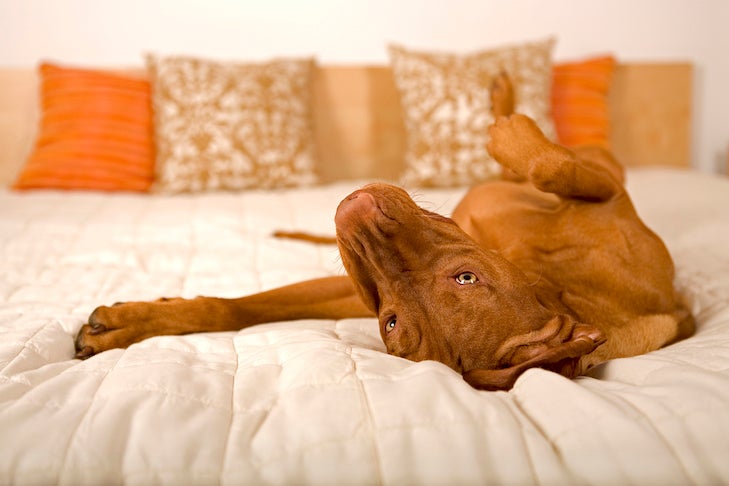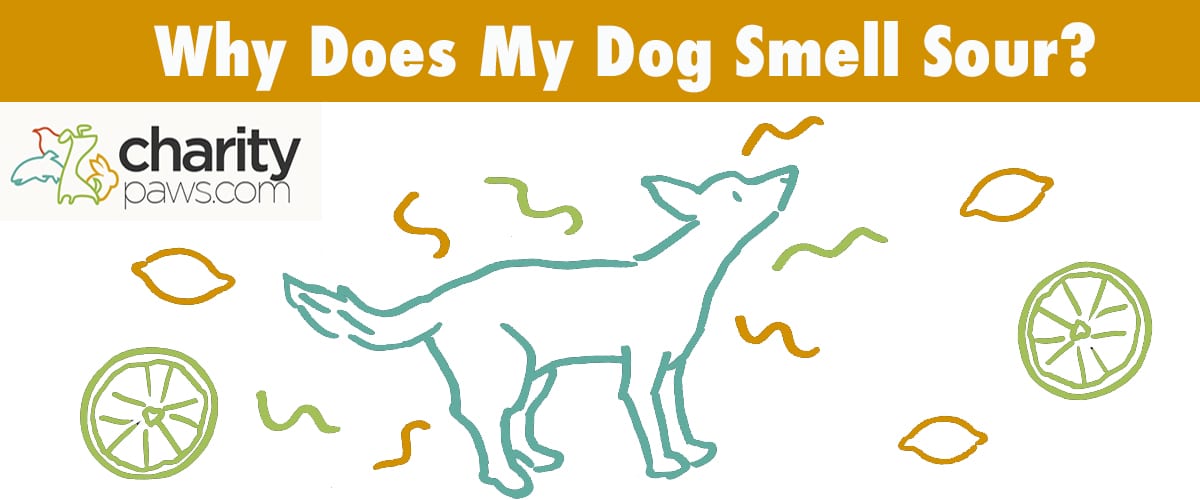Clubs Offering:
For many, spending more time at home during the pandemic meant tons more time with our dogs. If you took note of the way your dog smells, you weren’t alone. Many of us accepted a certain level of dog odors until we were spending time together 24/7 for weeks on end.
“I don’t think you should know that your dog is next to you just by your nose,” says Jackie Campbell, DVM, DACVD, from Animal Allergy & Dermatology of Colorado.
Ashley Bourgeois, DVM, DACVD, from Animal Dermatology Clinic Portland, adds that dogs pick up scents from their environment. Dogs with yards often smell like grass. Dogs from rural homes sometimes smell like hay. “With smaller dogs, their owners hold on to them a lot,” Bourgeois says. “Sometimes they smell like their detergents or perfumes.”


According to Campbell, many of us harbor misconceptions about giving dogs too many baths. She says monthly is a good idea for most dogs, but she sees canine patients who receive weekly baths or even daily showers. Today’s dog shampoos with lipids and ceramides help protect the skin from drying out.
Secondary yeast or bacterial infections on the skin or inside the ears remain the most common medical reasons dogs might smell awful. Allergies often begin the process, which leads to scratching and licking that open the door for infections.
“Secondary skin infections are usually things that we normally live with happily,” Campbell says, “but something went wrong that caused overgrowth.”
Malassezia yeast and staphylococcus pseudintermedius bacteria can overgrow on dogs, causing skin issues and odors. Look for:

Don’t waste time: Searching online or trying to fix things yourself can delay improvement. “Too often,” Campbell says, “I hear from owners, ‘Oh, my gosh! I wish I would have found you sooner. I’ve been dealing with this for two years, and in 30 days, I have a new dog.’ ”
Don’t use home remedies such as:
“Coal tar is a really old product, and it’s sometimes thought of as being more natural,” Campbell says, “but as we became more advanced, we realized that coal tar can act as a carcinogen, and it’s also so stinky.”
Bourgeois explains that veterinarians sometimes do use diluted solutions of vinegar topically to treat yeast infections. She says, “You have to be careful with the concentrations you’re using because they can be really irritating and damaging to the skin.”
Don’t go wild with spray-on fragrances. Bourgeois says that covering up dog odors with body sprays or perfumes can cause more skin irritation.
Don’t make assumptions about costs. In many cases, veterinary prescription products are more cost-effective and clinically effective because they feature higher concentrations of key ingredients such as:
With more people spending more time at home with their dogs, Bourgeois says, “It’s kind of an eye-opener for a lot of our clients to really see what a whole day for a pet with an infection or allergies looks like, and so we are getting more people seeking care because they’re noticing how big of an issue it is.”
Bourgeois adds, “If it starts getting worse and worse, reach out again because we do see things like infections where all of a sudden there are new lesions or your pet is even more uncomfortable. The severity may have increased enough that we feel like its valuable to come in.”
Roxanne Hawn is a journalist and award-winning dog blogger. She is the author of Heart Dog: Surviving the Loss of Your Canine Soul Mate.

 This article originally appeared in the award-winning AKC Family Dog magazine. Subscribe today!
This article originally appeared in the award-winning AKC Family Dog magazine. Subscribe today!
When Should I Take My Dog To A Vet For His Sour Smell?
You should always take your dog to the vet if you have any concerns about their health.
Things like skin and ear infections will do best with a formal diagnosis and prescription medications, rather than attempts to self-treat with products bought online.
Similarly, bad breath is usually an indicator that something has gone awry, either with the mouth and teeth or because of an underlying health issue.
This will require appropriate medical attention.
Most conditions do best when treated promptly, so don’t delay and get your dog checked if you are worried.

Your Dog Has A Dirty Collar Or Bedding
It’s worth looking at your dog’s possessions.
Perhaps his collar or harness needs a good wash?
Bedding too can become a bit pungent if it hasn’t been cleaned recently.
Ingrained dirt and skin oils can leave your dog’s belongings smelling a bit off, so take care to wash these at regular intervals to help your pet stay at his best, especially if he likes rolling in pungent things.
Some dog collars (leather, flea repellent) can also have an odor that smells like something sour.
If you have recently given your dog a new collar, check to see if that sour smell is actually coming from the new collar.
Why Your Dog Still Smells After a Bath
For many, spending more time at home during the pandemic meant tons more time with our dogs. If you took note of the way your dog smells, you weren’t alone. Many of us accepted a certain level of dog odors until we were spending time together 24/7 for weeks on end.
“I don’t think you should know that your dog is next to you just by your nose,” says Jackie Campbell, DVM, DACVD, from Animal Allergy & Dermatology of Colorado.
Ashley Bourgeois, DVM, DACVD, from Animal Dermatology Clinic Portland, adds that dogs pick up scents from their environment. Dogs with yards often smell like grass. Dogs from rural homes sometimes smell like hay. “With smaller dogs, their owners hold on to them a lot,” Bourgeois says. “Sometimes they smell like their detergents or perfumes.”
According to Campbell, many of us harbor misconceptions about giving dogs too many baths. She says monthly is a good idea for most dogs, but she sees canine patients who receive weekly baths or even daily showers. Today’s dog shampoos with lipids and ceramides help protect the skin from drying out.
Secondary yeast or bacterial infections on the skin or inside the ears remain the most common medical reasons dogs might smell awful. Allergies often begin the process, which leads to scratching and licking that open the door for infections.
“Secondary skin infections are usually things that we normally live with happily,” Campbell says, “but something went wrong that caused overgrowth.”
Malassezia yeast and staphylococcus pseudintermedius bacteria can overgrow on dogs, causing skin issues and odors. Look for:
Don’t waste time: Searching online or trying to fix things yourself can delay improvement. “Too often,” Campbell says, “I hear from owners, ‘Oh, my gosh! I wish I would have found you sooner. I’ve been dealing with this for two years, and in 30 days, I have a new dog.’ ”
“Coal tar is a really old product, and it’s sometimes thought of as being more natural,” Campbell says, “but as we became more advanced, we realized that coal tar can act as a carcinogen, and it’s also so stinky.”
Bourgeois explains that veterinarians sometimes do use diluted solutions of vinegar topically to treat yeast infections. She says, “You have to be careful with the concentrations you’re using because they can be really irritating and damaging to the skin.”
Don’t go wild with spray-on fragrances. Bourgeois says that covering up dog odors with body sprays or perfumes can cause more skin irritation.
Don’t make assumptions about costs. In many cases, veterinary prescription products are more cost-effective and clinically effective because they feature higher concentrations of key ingredients such as:
With more people spending more time at home with their dogs, Bourgeois says, “It’s kind of an eye-opener for a lot of our clients to really see what a whole day for a pet with an infection or allergies looks like, and so we are getting more people seeking care because they’re noticing how big of an issue it is.”
Bourgeois adds, “If it starts getting worse and worse, reach out again because we do see things like infections where all of a sudden there are new lesions or your pet is even more uncomfortable. The severity may have increased enough that we feel like its valuable to come in.”
Roxanne Hawn is a journalist and award-winning dog blogger. She is the author of Heart Dog: Surviving the Loss of Your Canine Soul Mate.

 This article originally appeared in the award-winning AKC Family Dog magazine. Subscribe today!
This article originally appeared in the award-winning AKC Family Dog magazine. Subscribe today!